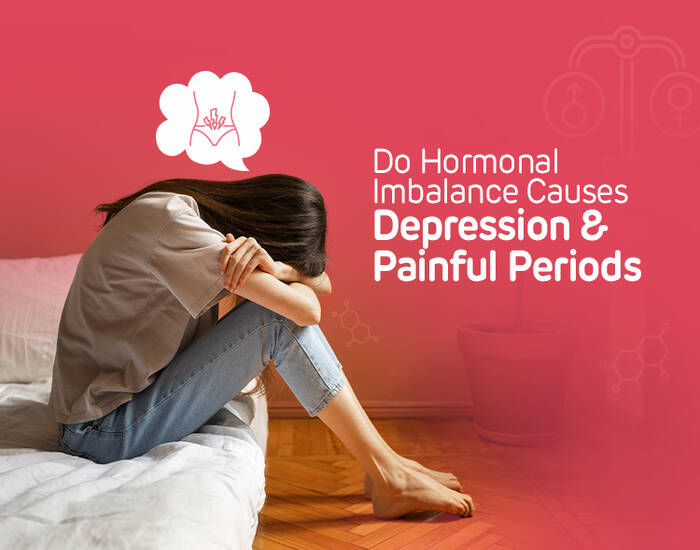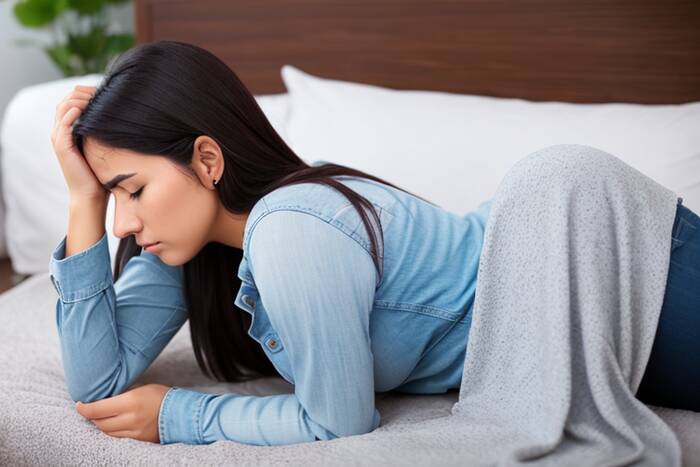
It is no secret that hormones are vital elements of the human body. They have a major say in regulating bodily functions and affecting a person’s mood. Hormones possess the power to bring about changes in mood and emotional well-being owing to the changes in their levels. Situations related to hormonal imbalance, which can possibly occur due to some bodily factors, and cause adverse conditions such as depression symptoms and painful periods.
There are, however, techniques to counter depression and period pains caused by hormonal issues. For instance, there are clinically proven methods such as period pain relief devices to beat hormone imbalance-induced period pains. This article explores the possibilities surrounding hormonal imbalances and their subsequent causes and coping mechanisms for period-related issues caused due to hormonal changes.
How Do Hormones Affect Mental Health and Cause PMS?
As much as you are aware that hormones have major control over determining and altering your mood, it is rather self-explanatory that the levels undergo fluctuations throughout life, particularly the peaking years of puberty and menopause.
It is to be noted that out of all the glands in the system, endocrine glands play a significant role in creating, storing, and releasing hormones throughout the body and ensuring balance. The prime purpose of these glands is to maintain the hormonal levels of your body.
As a matter of fact, if something affects the endocrine glands in your body and they go haywire[1], there is a higher chance that your hormonal levels can undergo a dysfunctioning phase.
This hormonal dysfunction can wreak havoc on your mental health and cause you more pain during periods. A depressed mind is more vulnerable to PMS symptoms and their intensity increases. Subsequently, the imbalance in hormones gives its way to a plethora of mental health conditions such as depression, anxiety, bipolar disorder, chronic stress, insomnia, memory problems, etc. These situations can worsen your already troublesome periods.
Can Hormones Cause Depression and Painful Periods?

Innumerable hormones exist and function in our bodies. However, only specific ones are related to our mood. And when they become imbalanced, these hormones make way to welcome the signs and symptoms of depression.
| Research suggests that hormonal imbalance, particularly the imbalance between estrogen and progesterone can cause extremely painful periods and more serious symptoms of PMS. |
Let us take a look at a list of some hormones that are linked to depression:
Estrogen
The estrogen helps in the production of dopamine and serotonin, which act as mood-regulating transmitters.
Testosterone
It is found in men in high levels that help regulate their bone health, muscle health, and sex drive.
Progesterone
Since it promotes calmness and relaxation, if not found at accurate levels, it can cause irritability, anxiety, and depression.
Cortisol
It helps manage stress and anxiety levels and is often tied to changes in weight.
Thyroid
It regulates energy levels and metabolism along with other bodily functions. Both types, hypothyroidism, and hyperthyroidism, are the sources linked to depression.
Insulin
It keeps blood sugar levels under check.
Both men and women undergo changes in hormone levels and therefore can be affected differently. It is mainly due to the presence of specific reproductive hormones—estrogen and progesterone that frequently fluctuates during the menstrual cycle.
According to Research, the regular fluctuation accompanied by other significant hormonal changes during pregnancy and menopause puts women on a radar that makes them susceptible to hormonal depression.
What are the Symptoms of Hormonal Imbalance Related Depression?
- A significant change in appetite
- Loss of energy
- Prolonged levels of low mood
- Difficulty in concentration
- Filled with agitation and irritation
- Loss of interest and enjoyment
- A significant change in sleep patterns
- Ignition of physical illness
What are the Causes of Hormonal Depression?
Depression alters the hypothalamic-pituitary axis which creates hormonal imbalance.
In order to get a better grasp of hormonal depression, let us first understand the conditions that could possibly trigger hormonal depression.
The following conditions may cause hormonal depression:
PMDD
Premenstrual dysphoric disorder (PMDD), similar to premenstrual syndrome (PMS), is way more severe in nature.
Take a look at some of the symptoms of PMDD that are listed below:
- Anxiety problems
- Severe depression
- Extreme anger
- Mood swings
- Panic attacks
- Constant fatigue
- Binge eating
- Difficulty sleeping
These symptoms are more likely to occur around 1 to 2 weeks before menstruation when the menstrual cycle hormone levels start to drop.
PMDD might occur due to increased sensitivity to changes in menstrual cycle hormones which includes changes in serotonin levels.
Menopause
The perimenopause phase, which is a transition period into menopause, has a higher chance to cause changes in mood and increase anxiety and sadness levels.
During perimenopause, the estrogen and progesterone levels fall, thereby triggering mood changes and causing episodes of depression. Perimenopause is likely to cause hot flashes, a primary symptom of the phase. This leads to sleep problems. And difficulty in sleeping is more likely to push people into depression.
Postpartum Depression
Postpartum depression is directly linked with the levels of allopregnanolone, a neurosteroid, which happens to be a type of steroid produced by the brain. It naturally occurs from the breakdown of progesterone.
The levels of allopregnanolone steadily rise to the third trimester of pregnancy. And post-childbirth, levels of allopregnanolone undergo a rapid decline.
Research suggests that the swift change occurring in the levels of allopregnanolone plays a crucial role in postpartum depression.
In several cases, the levels of allopregnanolone that generally rise post-childbirth, do not rise for some sections of people, and hence the depression seeps in.
Low Levels of Androgens
Females tend to produce lower levels of androgens, a subcategory of testosterone, than males. Since it is already low, it makes it even harder to diagnose in females.
The common symptoms of androgen deficiency found in females are:
- Lower levels of mood
- Fatigue
- Loss of motivation
- Loss of sex-drive
- Loss of strength
There are plenty of causes behind androgen deficiency in females. And some of them include:
- Removal or failure of ovaries
- Aging
- Loss of menstrual period
- Overproduction of prolactin
- Oral Estrogen Therapy
- Hypopituitarism, a pituitary gland disorder
Tips for Coping with Hormonal Depression and Painful Periods

If there are problems, there will also be an array of solutions to help you figure out your way. Similarly, depression might seem like an overwhelming situation, but you will come across several ways to tackle and deal with it.
As you have already gone through some set of underlying causes for hormonal depression, now you need to take measures that regulate and balance the hormone levels and give you a sigh of relief.
The common medical treatments to combat hormone-based symptoms of depression and period pains are as follows:
- Hormone regulating medications
- Hormone replacement therapy (HRT)
- Vaginal estrogen
- Hypothyroid medications, like levothyroxine
- Hyperthyroid medications, like methimazole
Apart from the medical treatments and medication, you can alternatively consider making some lifestyle changes. These changes are particularly helpful in relieving you from period pains and depression. They are as follows:
- Sticking to a balanced diet by avoiding processed foods will help you take your first helpful step to ease depressive symptoms.
- Physical activity in the form of exercises is crucial for maintaining your overall health and wellness. According to a study, regular exercise is beneficial to ease depression. It helps in raising endorphin levels, tiny neurochemicals that boost your mood.
- It is always helpful to be aware of your triggers. Figure out what factors may someway negatively trigger you and avoid them.
- Natural supplements such as red clover, ashwagandha, ginseng, and primrose are somewhat associated to soothe the symptoms related to hormonal irregularities. However, before implementing these supplements into your routine, make sure to have a word with the healthcare professional.
Conclusion
Based on the arguments placed above, it is now safe to say that hormonal imbalance does have its fair share of causing depression and period problems.
Hence, you should not take hormonal imbalance any lightly and take the best care of your health in combating the problems associated with the changes and cope with them accordingly.
Apart from pushing you into a depressive state, hormonal imbalance can also torture you with period pain problems. And like the coping mechanisms for hormonal balance, you can also say goodbye to your period pain with the period pain relief devices available for you.

Lifebing is driven by an unrelenting passion for promoting health and well-being, our team is wholly committed to curating exceptional content and immersive experiences.
